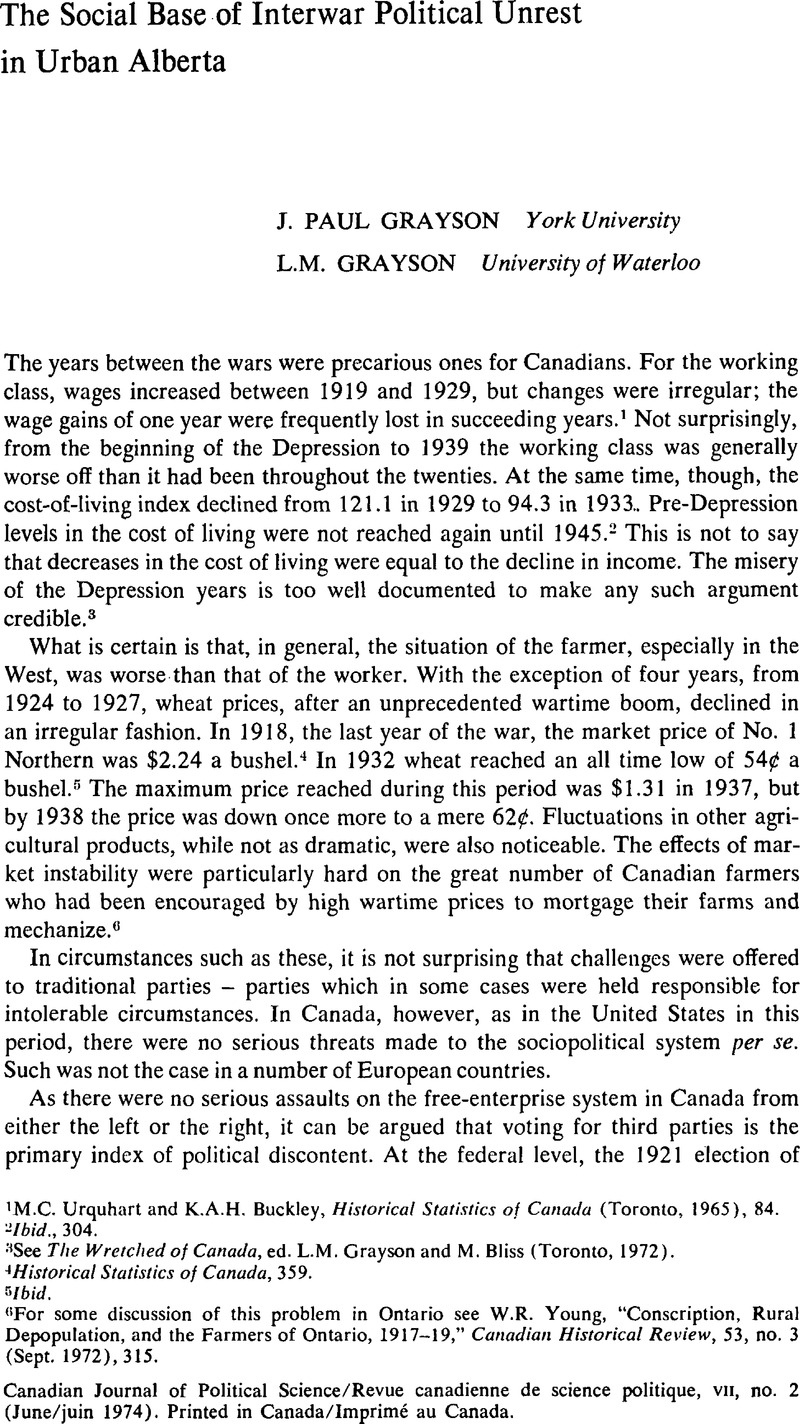Published online by Cambridge University Press: 10 November 2009

1 Urquhart, M.C. and Buckley, K.A.H., Historical Statistics oi Canada (Toronto, 1965), 84.Google Scholar
2 Ibid., 304.
3 See The Wretched of Canada, ed. Grayson, L.M. and Bliss, M. (Toronto, 1972Google Scholar).
4 Historical Statistics of Canada, 359.
5 Ibid.
6 For some discussion of this problem in Ontario see Young, W.R., “Conscription, Rural Depopulation, and the Farmers of Ontario, 1917–19,” Canadian Historical Review, 53, no. 3 (Sept. 1972), 315.CrossRefGoogle Scholar
7 Morton, W.L., The Progressive Party in Canada (Toronto, 1950Google Scholar).
8 Macpherson, C.B., Democracy in Alberta (Toronto, 1953; 1970Google Scholar), 25. Also see Sharp, P., The Agrarian Revolt in Western Canada (New York, 1948; 1971Google Scholar), chaps. 7 to 10.
9 It is ironic that on 28 May 1935 Conservative Prime Minister R.B. Bennett, on the eve of his downfall, confidently wrote of the political movements afoot: “I cannot think… that in a country like ours they are likely to make any permanent headway.” Public Archives of Canada (pac), R.B. Bennett Papers, Series f, Vol. 544, 337074. Letter from R.B. Bennett to W.E. Payne, 28 May 1935.
10 Historical Statistics of Canada, 620.
11 Ibid., 632.
12 S.D. Clark, “Foreword,” in The Progressive Party in Canada, viii.
13 Ibid.
14 Mann, W.E., Sect, Cult, and Church in Alberta (Toronto, 1955; 1972), 51–2.Google Scholar
15 S.D. Clark, “Foreword,” in Sect, Cult, and Church in Alberta, viii.
16 Ibid., ix–x.
17 Social Credit Movement in Alberta (Toronto, 1959; 1968), 338.
18 Democracy in Alberta, 220.
19 Ibid., 215.
20 Burnet, Jean, Next-Year Country (Toronto, 1951), 82.CrossRefGoogle Scholar
21 The Progressive Party in Canada, 271.
22 Ibid.
23 Lazarsfeld, P.F., Berelson, B. and Gaudet, H., The People's Choice (New York, 1944, 1960), 27.Google Scholar
24 Key, V.O., “Social Determinism and Electoral Decision: The Case of Indiana,” in Burdick, E. and Brodbeck, A. (eds.), American Voting Behaviour (Glencoe, 1959), 295.Google Scholar
25 The Progressive Party in Canada, 39.
26 The Social Credit Movement in Alberta, 197–224.
27 Allen, Richard, The Social Passion (Toronto, 1971), 197.Google Scholar
28 Ibid., 201.
29 Ibid., 349.
30 Ibid., 210.
31 The Social Credit Movement in Alberta, 232.
32 Next-Year Country, chap. 5.
33 The Social Credit Movement in Alberta, 241.
34 Historical Statistics of Canada, 96.
35 Duncan, O.D., Statistical Geography (Glencoe, 1961Google Scholar), chap. 3.
36 For one study of this problem carried out in Canada see Schindeler, F. and Hoffman, D., “Theological and Political Conservatism,” this journal, 1, no. 4 (Dec. 1968Google Scholar).
37 The Progressive Party in Canada, 105.
38 Next-Year Country, 84.
39 Crysdale, S., The Industrial Struggle (Toronto, 1961), 85.Google Scholar
40 Sect, Cult and Church in Alberta, 55.
41 It is also consistent with the analysis of at least one ccf supporter. In a letter to M.J. Coldwell, Charles Keeley comments that: “Unless the c.c.f. comes out and definitely promises the things we hope to accomplish and transplants it in terms of individual benefits similar to the technocrats i.e. $2500.00 a year to all, education and training to the age of 25 with a four hour day from then till retirement at 45 on full pay with absolute security from all material wants we may as well stay out of the campagne [sic]. The people will understand these things while such phrases as ‘Economic Security’ have no meaning and passes way over their heads.” pac, ccf Records, mg 28, iv-1, Vol. 182. Letter to M.J. Coldwell from Charles Keeley, Mayerthorpe, Alberta, 27 August 1935.